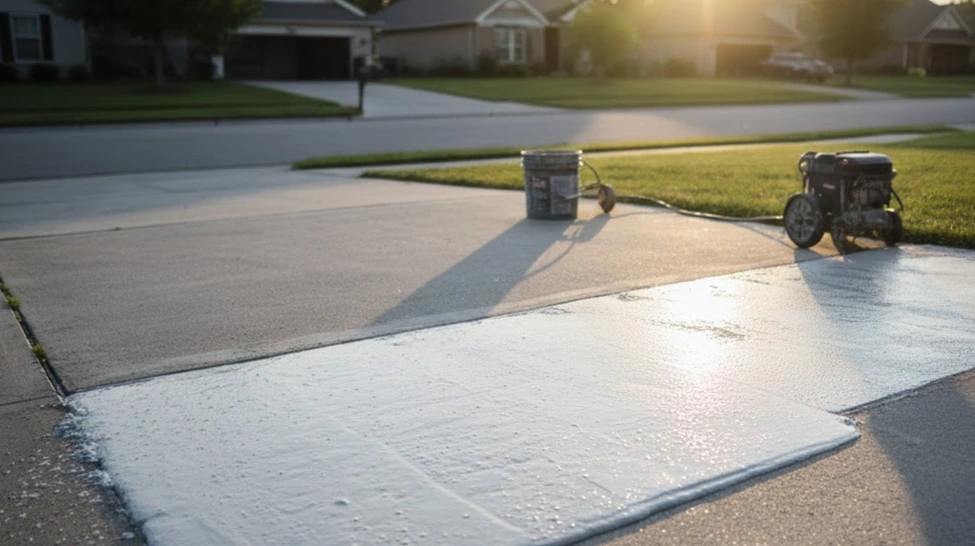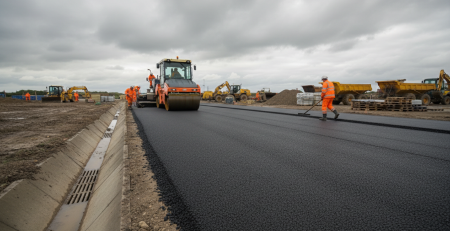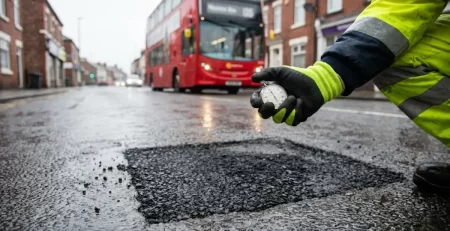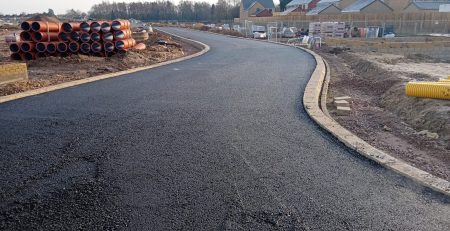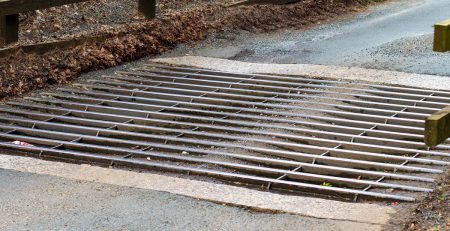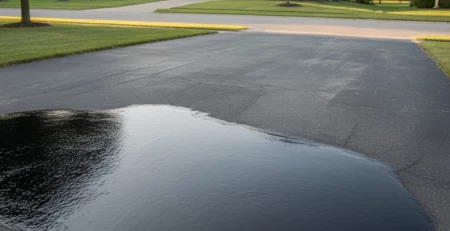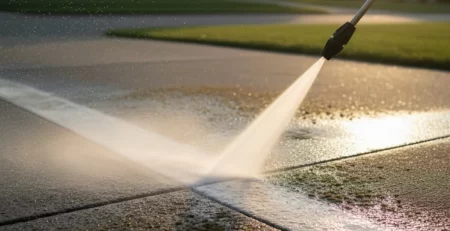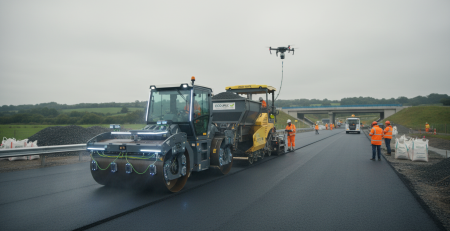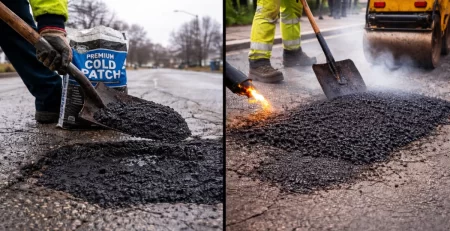Concrete Driveway Resurfacing Cost and Step-by-Step Guide for UK Homeowners
A tired, cracked concrete driveway doesn’t always need replacing. Concrete driveway resurfacing offers a budget-friendly alternative that breathes new life into worn surfaces. UK homeowners typically spend £30 to £50 per square metre for professional resurfacing, significantly less than full replacement costs.
This comprehensive guide reveals the essential factors that influence pricing, walks you through each resurfacing step, and shares proven strategies to maximize your investment while avoiding costly mistakes that could compromise longevity.
Concrete Driveway Resurfacing Cost in the UK: 5 Affecting Factors
Understanding what drives resurfacing expenses helps UK homeowners budget accurately and make informed decisions about their driveway projects.
Current Surface Condition
The state of your existing concrete plays a massive role in overall costs. Driveways with minor surface wear and minimal cracking require less preparation work, keeping expenses toward the lower end of the spectrum.
However, surfaces riddled with deep cracks, structural damage, or extensive deterioration demand extra repair work before resurfacing can begin. This preliminary remediation adds both material and labour costs to your project total.
Professionals typically assess whether resurfacing remains viable or if replacement becomes more economical. When damage affects more than 30% of the surface area, road surfacing contractors in the UK often recommend complete reinstallation rather than attempting cosmetic fixes.
Driveway Size and Layout
Square meterage directly impacts material quantities and labour hours required. A standard 30 square metre driveway costs approximately £900 to £1,500 for complete resurfacing, while larger 50 square metre installations can reach £1,500 to £2,500.
Complex layouts with curves, borders, or multiple access points increase labour time and material waste, pushing costs upward. Properties with awkward access or narrow entry points face additional challenges that extend project timelines.
Geographic location within the UK also matters considerably. Homeowners in London and the South East typically face premium rates compared to those in Northern England or Wales, where labour costs run lower.
Material Selection and Finish Type
Standard concrete resurfacing mixtures offer the most economical option at £30 to £40 per square metre. Decorative finishes like stamped patterns, exposed aggregate, or coloured overlays increase costs to £45 to £65 per square metre.
These premium options deliver enhanced visual appeal that rivals alternatives like resin driveways in the UK, which command higher installation fees but offer unique aesthetic benefits. The choice between standard and decorative finishes depends on budget priorities and desired curb appeal.
The thickness of the resurfacing layer affects pricing, too. Most applications apply 1/8 to 1/4 inch overlays, but damaged surfaces might require thicker applications, consuming more material and increasing overall expenses.
Labour and Professional Expertise
Skilled tradespeople charge £200 to £400 per day, depending on experience and regional rates. A typical residential driveway resurfacing project requires two to three days, including preparation, application, and finishing work.
Hiring established commercial road surfacing solutions in the UK specialists ensures quality workmanship but often costs 15 to 25% more than smaller local contractors. The premium pays for experience, proper equipment, and warranty protection.
DIY resurfacing might seem tempting for budget-conscious homeowners, but improper surface preparation or application technique leads to premature failure. Professional installation includes warranty coverage that protects your investment against defects and workmanship issues.
Additional Features and Requirements
Drainage improvements, edge repairs, or expansion joint replacement add supplementary costs to base resurfacing prices. Proper drainage prevents water pooling that undermines resurfacing longevity, making this investment worthwhile despite upfront expenses.
Sealing the finished surface adds £3 to £5 per square metre but dramatically extends lifespan by protecting against moisture penetration and surface staining. This protective layer shields your investment from weather damage and everyday wear.
Some properties require permits or must accommodate specific access restrictions that complicate material delivery and equipment positioning. These logistical challenges inflate labour time and overall project costs beyond standard estimates.
Step-by-Step Guide to Concrete Driveway Resurfacing
Professional resurfacing follows a systematic process that ensures durable results and maximizes the lifespan of your refreshed driveway surface.
Surface Cleaning and Assessment
The initial phase involves thoroughly cleaning the existing concrete to expose all damage and contamination. Pressure washing equipment operating at a minimum of 3000 PSI removes dirt, oil stains, moss growth, and loose material effectively.
This step reveals the true condition of your driveway and helps contractors identify areas needing extra attention before proceeding. Proper assessment prevents surprises during application that could compromise results or increase costs unexpectedly.
Allow the cleaned surface to dry completely for 24 to 48 hours before proceeding with repairs or resurfacing. Moisture trapped beneath new resurfacing layers causes bond failure and premature deterioration that ruins the entire project.
Crack Repair and Surface Levelling
All cracks wider than 1/8 inch require filling with specialized concrete crack filler before resurfacing begins. This repair work creates a stable foundation that prevents damage from telegraphing through the new surface layer.
Deep cracks or structural issues might necessitate grinding down high spots or filling low areas to establish a level base. Professional contractors use specialized equipment to achieve proper surface preparation that ensures lasting results.
Edge repairs ensure clean boundaries and prevent material spillage during application. This preparatory work separates professional results from amateur attempts and significantly impacts long-term performance and visual appeal.
Bonding Agent Application
A concrete bonding agent creates the chemical bridge between old and new surfaces, preventing delamination and ensuring proper adhesion. Mix the bonding agent according to the manufacturer’s specifications and apply evenly using spray equipment or brushes.
Work in manageable sections to prevent premature drying, which compromises adhesion strength and leads to surface failure. Proper timing ensures the bonding layer remains tacky for optimal chemical bonding when the resurfacing mixture contacts it.
The resurfacing mixture must be applied while the bonding agent remains tacky, typically within 30 to 60 minutes. Timing this phase correctly requires experience and contributes to why professionals deliver superior results compared to DIY efforts.
Resurfacing Mixture Application
Pour the prepared resurfacing mixture onto the bonded surface and spread evenly using long-handled squeegees or specialized application tools. Maintain consistent thickness throughout, typically 1/8 to 1/4 inch, depending on surface condition and project requirements.
Work systematically from one end to the other to avoid lap marks where sections overlap unevenly. Properties considering alternatives like resin bound driveways in Hertfordshire should note that professional installation remains equally critical for those systems.
Create desired texture immediately after application using brooms, trowels, or specialized tools. This step determines the final appearance and slip resistance of your driveway, making the technique crucial for both safety and aesthetics.
Curing and Finishing
Proper curing ensures maximum strength and durability of your newly resurfaced concrete driveway in Essex. Keep the resurfaced area damp for 24 to 48 hours during warm weather by misting lightly with water several times daily.
Avoid foot traffic for 4 to 6 hours and vehicle traffic for a minimum of 48 to 72 hours after application. Rushing this timeline risks surface damage, imprints, or weakening the bond between old and new concrete layers.
Apply a concrete sealer after 28 days of curing for optimal protection against moisture penetration, staining, and surface deterioration. This final treatment extends lifespan considerably and simplifies ongoing maintenance requirements throughout the surface’s service life.
Cost-Saving Tips for UK Homeowners
Strategic planning helps stretch your resurfacing budget without compromising the quality or longevity of your finished driveway surface.
Timing Your Project Strategically
Schedule resurfacing during spring or early autumn when weather conditions remain stable and contractors face lighter workloads. Summer represents peak season with premium pricing, while winter weather creates application challenges that compromise results.
Booking during shoulder seasons often yields 10 to 20% discounts as contractors prefer steady work over idle periods. This timing strategy delivers identical quality at reduced prices simply by avoiding peak demand periods.
Multiple neighbours coordinating projects simultaneously can negotiate bulk discounts with contractors. Contractors reduce mobilization costs when working multiple properties in the same area, passing savings along to homeowners through reduced per-project pricing.
Comparing Multiple Quotes
Obtain detailed written estimates from at least three reputable contractors before committing to any project. Compare not just pricing but also materials specified, preparation methods included, warranty terms offered, and realistic project timelines.
The lowest bid rarely delivers the best value if it cuts corners on essential preparation steps or uses inferior materials. Research concrete driveway cost benchmarks for your region before accepting quotes to identify suspiciously low bids.
Understanding typical pricing helps identify potential quality issues hidden behind attractive headlines. Consider checking providers of resin driveway cost estimates too, as comparing different surfacing options ensures you’re selecting the most appropriate solution for your specific needs.
Handling Preparation Work Yourself
Capable DIY enthusiasts can reduce costs by handling basic preparation tasks like clearing vegetation, removing loose material, or basic pressure washing. These straightforward tasks don’t require specialized skills or equipment but consume contractor time.
However, leave technical tasks like crack repair, surface levelling, and actual resurfacing application to qualified professionals. This hybrid approach typically saves £200 to £400 on labour costs without compromising finished quality.
Be realistic about your capabilities and available time before committing to DIY preparation. Botched preparation work creates problems that professionals must correct, potentially increasing overall costs beyond what hiring full-service contractors would have required.
Choosing Standard Over Premium Finishes
Plain concrete resurfacing delivers excellent durability at the lowest cost available for driveway renewal projects. Decorative finishes add aesthetic appeal but increase expenses by 30 to 50% compared to standard grey concrete applications.
Unless visual impact justifies the premium, standard grey concrete provides decades of reliable service. Simple broom finishes offer good traction without added expense while maintaining a clean, professional appearance.
Allocate your budget toward quality materials and thorough preparation rather than elaborate decorative touches. Solid foundations matter more than surface embellishments for long-term satisfaction and driveway performance over its entire lifespan.
Maintenance Tips After Resurfacing
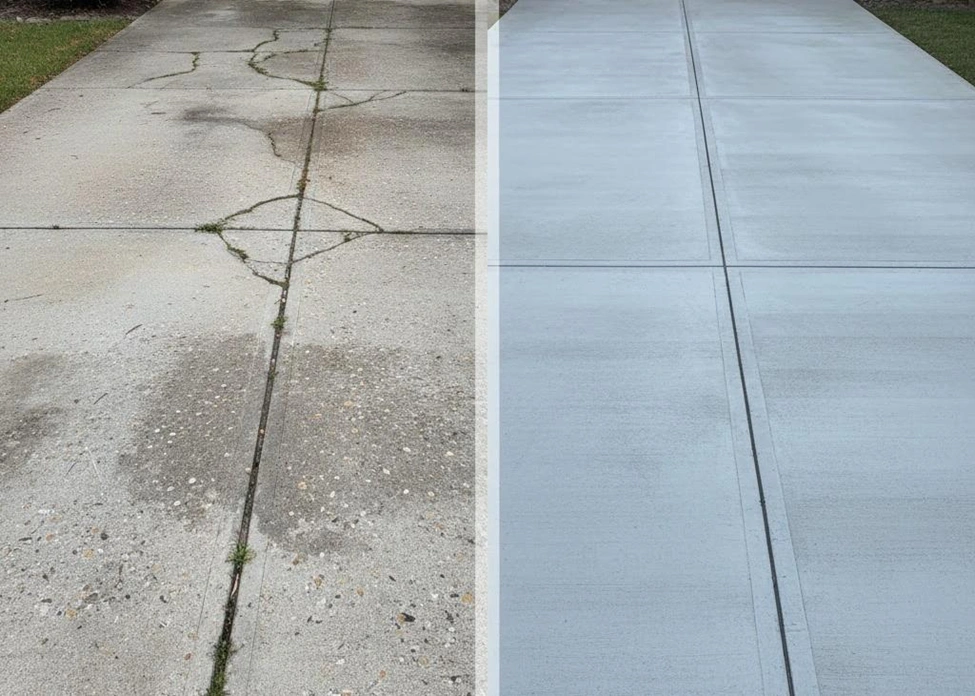
Proper care extends your resurfaced driveway’s lifespan and preserves its appearance throughout years of service and exposure to UK weather conditions.
Regular Cleaning Practices
Sweep your driveway weekly to remove debris, leaves, and dirt that trap moisture against the surface. Accumulated organic material promotes moss growth and moisture retention that accelerates concrete deterioration over time.
Pressure wash once or twice annually to eliminate stubborn stains, tire marks, and organic growth that regular sweeping cannot address. Use appropriate pressure settings to avoid damaging the resurfaced layer through excessive force.
Address oil leaks, chemical spills, or other contaminants immediately when they occur. These substances penetrate concrete and cause permanent staining or surface deterioration if left untreated for extended periods.
Periodic Sealing Requirements
Reseal your concrete driveway every three to four years to maintain moisture resistance and surface protection. UK weather patterns with alternating wet and dry periods accelerate sealant breakdown, making regular reapplication essential for longevity.
Quality sealants cost £3 to £5 per square metre but dramatically extend resurfacing lifespan by preventing water infiltration. This protection becomes especially crucial during winter months when freeze-thaw cycles cause the most damage.
Some homeowners prefer annual sealing for maximum protection, particularly in regions experiencing harsh winters. The additional investment pays dividends through extended surface life and reduced repair requirements over the driveway’s service period.
Crack Monitoring and Prompt Repairs
Inspect your driveway quarterly for new cracks or surface deterioration that signal developing problems. Regular monitoring allows you to catch issues early when repairs remain simple and inexpensive.
Address hairline cracks immediately using flexible crack filler before they widen and allow water penetration beneath the surface. Early intervention prevents minor issues from requiring extensive repairs that consume significant time and money.
Pay particular attention to edges, expansion joints, and areas around drainage points where stress concentrates. These vulnerable zones typically show problems first and benefit most from proactive maintenance attention.
Winter Protection Strategies
Avoid using metal shovels or aggressive ice-melting chemicals that damage concrete surfaces during snow and ice removal. Metal tools scratch and gouge resurfaced concrete, while harsh chemicals accelerate surface deterioration through chemical reactions.
Opt for plastic snow removal tools and calcium chloride-based deicers that minimize concrete exposure to damaging substances. Sand provides traction without chemical risks, offering a completely safe alternative for improving winter safety.
Ensure proper drainage routes remain clear throughout winter to prevent water pooling and freezing on your driveway surface. Standing water creates freeze-thaw cycles that crack and degrade resurfaced concrete rapidly, undermining your investment.
Our UK Surfacing Service Areas
Total Surfacing Solutions proudly serves customers across the UK, focusing on delivering dependable driveway installations and surface upgrades. Our main service areas include Hertfordshire and Essex, where we provide tailored solutions for both residential and commercial needs.
Hertfordshire:
In Hertfordshire, we offer a wide selection of surfacing services that range from new tarmac and resin bound driveways to large road resurfacing projects. Our team also manages commercial car parks, school playground surfacing, and precise line marking. Using durable materials and refined installation methods, we ensure every resin surface in Hertfordshire is built for strength and long-term performance.
Essex:
Across Essex, our experienced installers deliver high-quality resin driveways in Essex, tarmacadam resurfacing, driveway repairs, and commercial surfacing work. We also create safe, long-lasting playgrounds and sports surfaces suitable for schools, clubs, and public facilities. With attention to detail and reliable workmanship, we provide smooth, clean finishes that stand the test of time.
Whether you’re in Hertfordshire or Essex, Total Surfacing Solutions is committed to delivering quality you can trust.
Frequently Asked Questions
How long does concrete driveway resurfacing last?
Professionally applied concrete resurfacing typically lasts 10 to 15 years with proper maintenance and care. Factors affecting longevity include climate conditions, traffic levels, surface preparation quality, and maintenance consistency throughout the service period.
Regular sealing and prompt crack repairs extend lifespan considerably beyond minimum expectations. Some well-maintained resurfaced driveways exceed 20 years of service before requiring renewal or replacement.
Can I resurface my concrete driveway myself?
While DIY concrete resurfacing is technically possible, achieving professional-quality results requires specialized knowledge, equipment, and experience. Surface preparation accounts for 60% of project success, and improper technique leads to premature failure.
Most homeowners achieve better long-term value by hiring qualified professionals despite higher upfront costs. The investment delivers warranties, proper equipment usage, and expertise that ensures lasting results worth the premium.
What’s cheaper: resurfacing or replacing a concrete driveway?
Resurfacing costs approximately £30 to £50 per square metre compared to £60 to £100 per square metre for complete replacement. Resurfacing proves substantially cheaper when existing concrete remains structurally sound with only surface damage.
However, extensively damaged driveways with structural issues make replacement more economical long-term. Professionals assess whether resurfacing delivers value or if replacement better serves your needs and budget.
How soon can I drive on resurfaced concrete?
Avoid vehicle traffic on newly resurfaced concrete for a minimum of 48 to 72 hours after application. Full strength develops over 28 days as the material cures completely through chemical reactions.
Light foot traffic becomes safe after 4 to 6 hours in normal weather conditions. Rushing this timeline risks surface damage, imprints, or weakening the bond between old and new concrete layers.
Transform Your Driveway Investment
Concrete driveway resurfacing delivers exceptional value for UK homeowners seeking to revitalize worn surfaces without replacement costs.
Understanding the five key cost factors, following proper application steps, implementing smart savings strategies, and committing to routine maintenance ensure your investment performs beautifully for years.
Whether you’re comparing quotes from contractors or exploring alternatives, thorough research and realistic budgeting create the foundation for a successful driveway renovation that enhances both property value and curb appeal.

